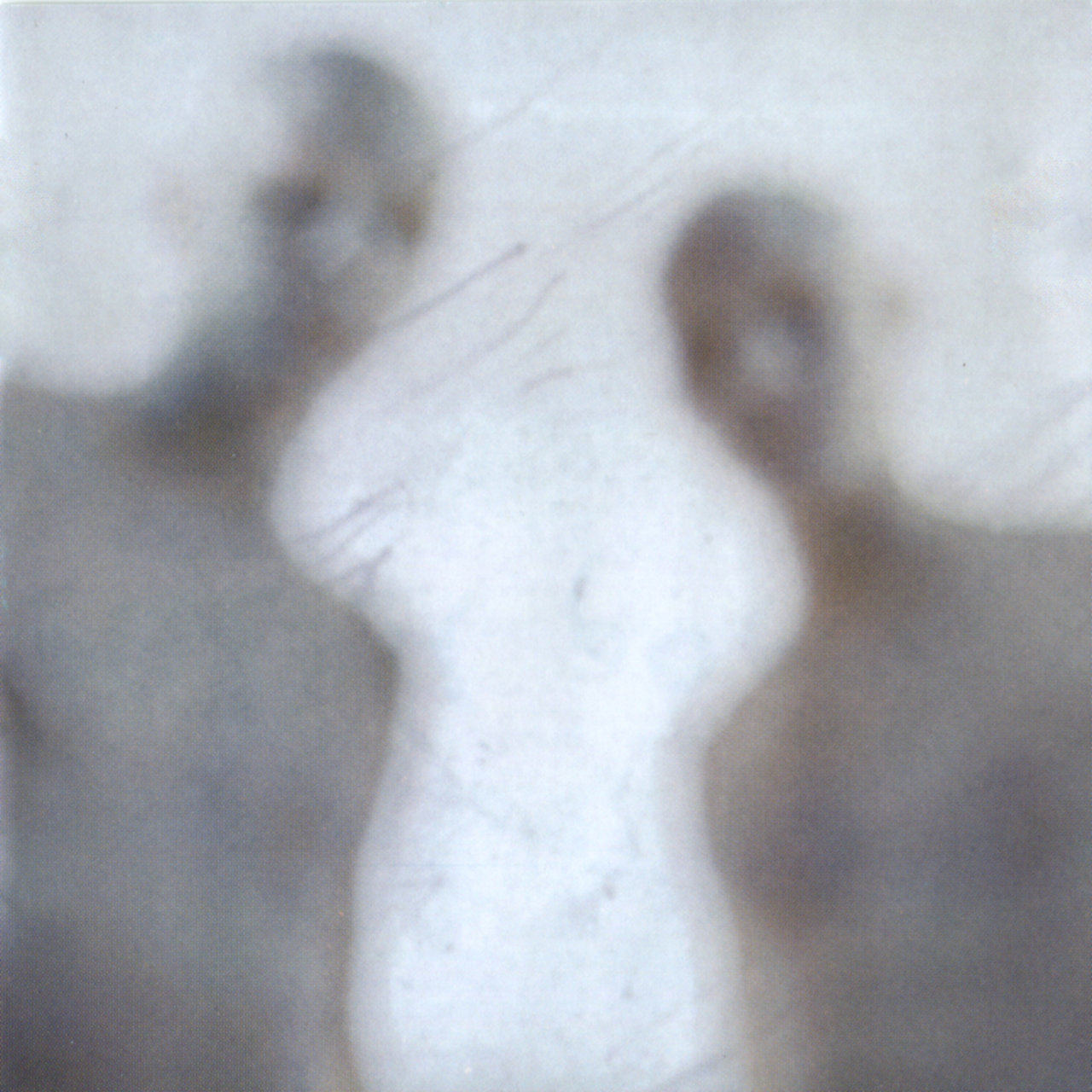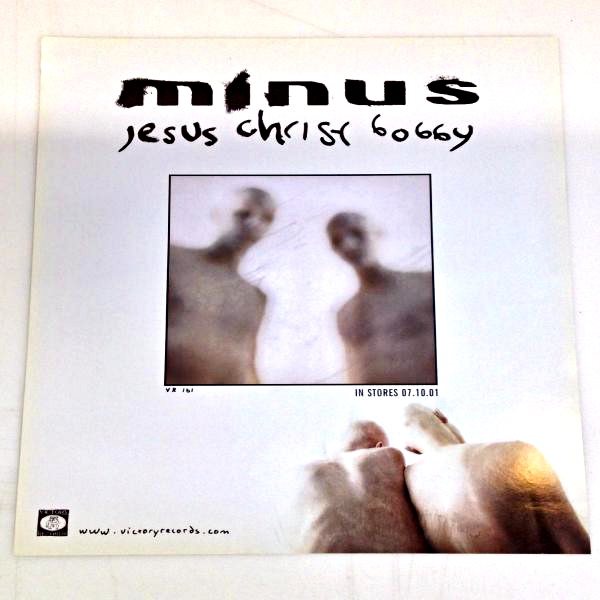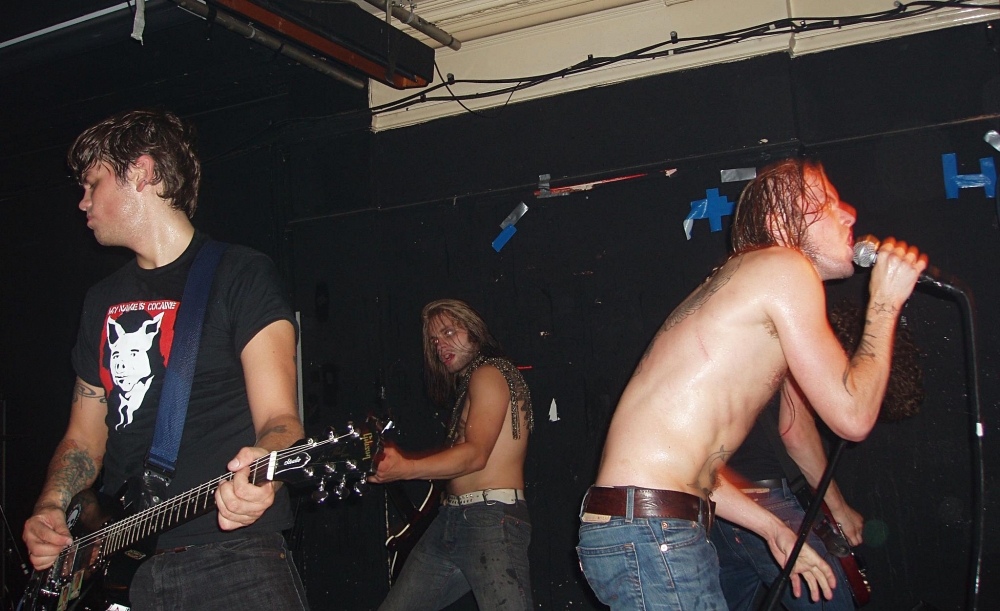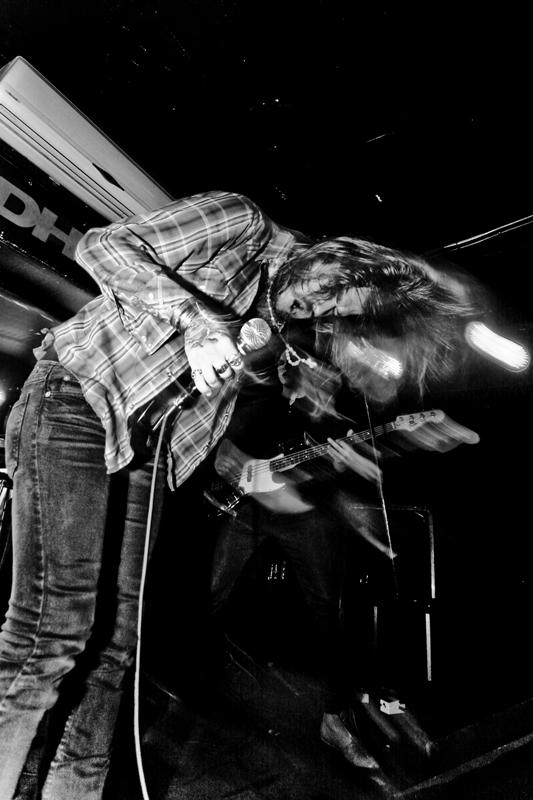
As anyone into hardcore knows, the proverbial book on Victory Records is littered with both inspiring and polarizing chapters. I'm not here to validate or comment on any of them. Instead, my aim is to try and make some sense of an album so singular in its presentation and reception, the sorest of all thumbs in a vast and expansive catalog. I’m here to celebrate an album I first discovered in a Baltimore budget bin. As much as it owes a great debt to early metallic hardcore, noise rock, harsh electronics, and punk rock; it carves a unique and original path.
Take one look at their profile on the Victory Records website, the "Message From Minus" in conjunction with the promotional photo (seen above), paints the band as a mirror reflection of both our best and worst qualities: vanity, shame, grief, remorse, fame, and isolation. If I were to stuff the muddied prose of their sentiment into a nutshell, it’d read "We’re here, we're weird, we’re from Iceland." All of these statements are accurate but still fail to accurately summarize a decidedly wild and crazy fucking ride. Their handle on atmospherics, chaos, and musicality as barely post-teens is mind-boggling.

On July 10, 2001; scene stalwart Victory Records released a complete mystery of an album, the aptly titled Jesus Christ Bobby by Icelandic hardcore freakniks Minus. It's anyone's guess as to how and why the album cycle ultimately resulted in, as I remember, a collective shrug and the overwhelming buzz of a cricket's call. Coming from Iceland certainly didn't do them any favors, nor did the fact that any heavy album released in this particular year was destined to stand in the shadow of the mighty Jane Doe. Perhaps it was inadvertently saddled with the metalcore tag. Far too cerebral for some and far too oddball for others, it was destined to be an album that takes a decade or two to get its due and perhaps the reason they made a left turn shortly hereafter.

Lyrically and musically, the album reads and plays like a musical cabinet of curiosities. Coincidentally, their debut, also titled with both a name and exclamation, "Hey, Johnny" is a decidedly more straightforward pastiche of metal and Hardcore in the tradition of peers Zao or even Vision of Disorder circa Imprint. It's the background take to this debut's recording that's perhaps the most puzzling part of the band's early career. It truly reads like a screenplay about a young band on the rise. After winning what is, in essence, an Iceland-wide Battle of the Bands, Minus' well-earned victory (pardon the pun) was rewarded with both a decent budget to record as well as an opening slot for the mighty Fugazi, the gold star in the grandest of punk spelling bees. What came next was every bit the bizarre continuation. They went on to sand the rough edges and trade in their methodical mayhem in order to share stages with Muse, QOTSA, Foo Fighters, and fucking Metallica.
Listening to their latter day works is a puzzling and frustrating exercise, as I firmly plant Minus' Jesus Christ Bobby in my Top Ten metalcore records of all time.
"What comes next" would seemingly become the great thematic underpinning of the band's work. The follow-up found the group turning to Curver Thoroddsen, a daring fringe artist know for his outsider art, music and collaborating with Bjork, Iceland's most famous and eccentric musician. Already keyed in to the noisier end of their local punk spectrum, made popular by hometown favorites Ham and Purrkur Pillnikk whom both stretched and warped the limits of the standard formula; Minus was primed to make a weird one... and that they did. Their self-described attempt to "make disgusting music" yielded what is perhaps one of the most challenging, experimental and complete hardcore-adjacent records of the early 'oughts. It's made altogether more bizarre by the fact that it's not written in their native language resulting in a choppy translation that only adds to the album's oddball aesthetic. This album is a like a last meal best digested track by track. The 2000 Icelandic release, though comprised of the same tracks, suffers from a clumsy reshuffle of track order.

"Chimera," as good as an opener as it is, is the first false flag... a chugging and standard Snapcase riff that devolves into a diverse and noisy mathcore whirlwind. The lyrics, however, introduce us to the dual nature of the band itself. At once both striving for and in fear of success, "Chimera's" first steps immediately find them at a crossroads. As much as the band flexes their collective muscles on the track, it’s deceptively more simple than what follows. Second track "Leisure", quite literally about enjoying yourself, is anything but an audio exploration of joy and self-expression. Instead, it's all stutter steps and violent digital bleeps atop an absolutely bludgeoning noisecore attack. The stunted sensibilities of the rhythm section propel us uneasily into trying to find it's buried groove.
Lest you thought we'd get out of the article without referencing Eighteen Visions, "Modern Haircuts" at it's basest and most literal is a takedown of the hipster aesthetic while acknowledging we're all susceptible and conscious of it. As much of a late '90s/early '00s timestamp as the lyrical content is, the track wouldn’t feel out of place today. It’s a master class of deftly played noisy hardcore adorned with spoken vocals. The track finds Minus at their most rock 'n' roll, embracing and decrying fashionista hardcore culture that again drapes a muscular template of noise rock and metalcore with a gauzy haze of electronics. Awash in a circular rhythm, the melding of such disparate sounds has a nauseating yet beautiful effect. The track features guest vocals from Einar Örn, a reknowned Icelandic musician who was formerly a member of Sugarcubes.

As if daring the listener to be lulled into complacency by the previous track's ambient ending, "Misdo" is an absolute shitstorm of sound, filled to the brim with pummeling hardcore and the stunted headfuck of some of metalcore's finest, it's topped with Cryptkeeper vocals, befitting of the cvltest of black metal bands. The sonic assault is then flipped on its head, as the bass runs impressively in concentric circles, recalling jazz hardcore gods NoMeansNo. Ever the unpredictable band, "Electra Complex." which is analogous to the Oedipal complex, continues mining genres that I'd rarely seen converge (again w/ the puns).

Minus seamlessly was able to blend dissonant and pissed-off hardcore in the tradition of Bannon's brooding with Converge. It also taps into the absolute “no rules apply” policy of Cop Shoot Cop or a straighter Arab on Radar. The unease is a sad and contemplative framework through which to explore what seems to be a tale of teen suicide. A foreboding task, indeed, but they manage it with aplomb. Ending with a stunning and surprising two minutes of serenity, I found myself hitting replay to ensure I was still listening to the same album. Buried in the mix, one can detect an all but unintelligible lullaby that, in normal circumstances, would seek to calm and soothe. In the hands of this band, however, it's devastating and suspicious, a bloodletting.
Loosely about the solidarity in and communal aspect of music, "Frat Rock" is a molten mass of undulating waves of sound. Though unfortunately named, the fraternity the band clearly had with each other at the time was palpable and exciting. The influence of Curver can be heard in the track, as it's avantgarde approach seems to seek a sonic equivalent for nihilism itself, a joke that never ends and was always destined to fail by design. "Arctic Exhibition" is, perhaps, the biggest surprise in an album laden with them. What starts as a straight-faced coffee shop acoustic tune, well, ends as one. Strangely the only track without printed lyrics, it's a plaintive and intentionally saccharine tune that immediately calls to mind both Incubus and Filter, who scored huge, albeit lukewarm hits plying the singer-songwriter end of their sound. As it nears its finale, the track simply washes away into the sound of a sinister and frigid Arctic wind. It's as if they were setting us up...

"Liquid Courage" sprints furiously out of the gate, a brutal and aurally offensive slice of digital hardcore that seems to explore substance abuse and its enduring effects on the Arts. For a band reputed to be hard-partying and indulgent, it's a strange but convincing moment of self-reflection in it's first act. The following track, "Denver," is likely the most glaring indicator of where they'd land with subsequent albums. Decidedly less interesting, heavy, and daring; the bold and interesting metallic noise that comprises the meat of the song is bookended by a radio rock chorus worthy of placement on the first Foo Fighters LP. "Peccadillo" is an exemplary piece relegated to a particular place and time, with a sassy call and response a la Glassjaw combined with broken and brutal breakdowns.
If I have any peccadillos (it's obviously not bad puns), it's a shitty drum sound. Though I'm sure it's intentional, they sound as if they're recorded underwater... a buried and distant sound that could have been boosted with a crisper, more immediate mix. Though not numerically the last song, the final track of Jesus Christ Bobby is "Pulse", which marries an almost sunny melody and amazing basswork with '90s grunge vibes. It has me thinking of Ken Mode covering Fugazi.
In the age of CDs, the unlisted or "bonus track" was oftentimes a throwaway or cast-off track unfit to sit alongside the album tracks. Minus take us a step further, as "Bonus Track" goes full Merzbow. What sounds at first completely unlistenable and wonderfully frustrating is actually every track played simultaneously... backwards. Jesus Christ, Minus.
2003's Halldor Laxness and 2007's clever, Pantera- baiting The Great Northern Whalekill were, by all accounts, more successful endeavors for the group that further paddled the boat away from our scene. As stated before, they managed to split stage time with enormous acts, far removed from their roots. They remind me of Fireside, another challenging and exciting act that moved consistently further away from the underground with each successive piece of music. For a minute, though, they were ours. Jesus Christ Bobby is a hardcore record by a band that never sounded even remotely like a hardcore band again. On this record, though, they manage a consistent and interesting listen, they challenge the "verse/chorus/verse" template entirely and followed their own path.
In an era of riff assemblage as songwriting, they wrote bent and fractured freakouts and called them songs. Vocally, the gamut run on Minus’ finest hour is impossibly diverse. From the exorcism gurgles to the hardcore madman to the sneering sass of metalcore, it even recalls Wrangler Brutes-era Sam McPheeters at times.

Had this been released in 2018, they'd surely be sharing stages with Vein and their equally challenging contemporaries. The tragedy is that I'm in love with a record that never took me on a second date. This album captures a band destined to move out of their starter home and find somewhere nicer. Fuck the security deposit. They burned that sucker to the ground.




















